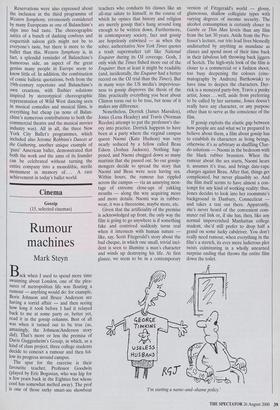Cinema
Gossip (15, selected cinemas)
Rumour machines
Mark Steyn
Back when I used to spend more time swanning about London, one of the plea- sures of metropolitan life was floating a rumour — anything would do: for example, Boris Johnson and Bruce Anderson are having a torrid affair — and then seeing how long it took before I had it relayed back to me at some party or, better yet, read it in the gossip columns. Best of all was when it turned out to be true (as, amazingly, the Johnson/Anderson story did). That's more or less the premise of Davis Guggenheim's Gossip, in which, as a kind of class project, three college students decide to concoct a rumour and then fol- low its progress around campus. The spur for the exercise is their favourite teacher, Professor Goodwin (played by Eric Bogosian, who was hip for a few years back in the Eighties but whose cool has somewhat melted away). The prof is one of those sarky smart-ass showboat teachers who conducts his classes like an all-star salute to himself, in the course of which he opines that history and religion are merely gossip that's hung around long enough to be written down. Furthermore, in contemporary society, fact and gossip are hopelessly entwined — as when the sober, authoritative New York Times quotes a trash supermarket tab like National Enquirer during its OJ coverage. Gosh, I only wish the Times fished more out of the Enquirer: then at least it might be readable (and, incidentally, the Enquirer had a better record on the OJ trial than the Times). But in many ways the US media's impervious- ness to gossip disproves the thesis of the film: practically everything you hear about Clinton turns out to be true, but none of it makes any difference.
Nonetheless, Derrick (James Marsden), Jones (Lena Headey) and Travis (Norman Reedus) attempt to put the professor's the- ory into practice. Derrick happens to have been at a party where the virginal campus queen Naomi (kate Hudson) was very nearly seduced by a fellow called Beau Edson (Joshua Jackson). Nothing hap- pened, and Naomi chugged down so many martinis that she passed out. So our gossip- mongers decide to spread the story that Naomi and Beau were seen having sex. Within hours, the rumour has rippled across the campus — via an annoying mon- tage of extreme close-ups of yakking mouths — along the way acquiring more and more details: Naomi was in rubber- wear, it was a threesome, maybe more, etc.
Given that the artificiality of the premise is acknowledged up front, the only way the film is going to go anywhere is if something fake and contrived suddenly turns real when it intersects with human nature like, say, Scott Fitzgerald's story about the bad cheque, in which one small, trivial inci- dent is seen to illumine a man's character and winds up destroying his life. At first glance, we seem to be in a contemporary version of Fitzgerald's world — glossy, glamorous, shallow collegiate types with varying degrees of income security. The alcohol consumption is certainly closer to Gatsby or Thin Man levels than any film from the last 30 years. Aside from the Pro- fessor's lecture, our trio lead lives blessedly undisturbed by anything as mundane as classes and spend most of their time back in their fabulous loft throwing back jiggers of Scotch. The high-style look of the film is closer to a commercial or a fashion shoot, too busy deepening the colours (cine- matography by Andrezej Bartkowiak) to have time to deepen the characters. Der- rick is a moneyed party-boy, Travis a punky artist, Jones ... well, aside from preferring to be called by her surname, Jones doesn't really have any character, or any purpose other than to serve as the conscience of the fihn.
If gossip exploits the elastic gap between how people are and what we're prepared to believe about them, a film about gossip has to establish its characters as living beings, otherwise it's as arbitrary as shuffling Clue- do solutions — Naomi in the bedroom with the black rubber brassiere. When the rumour about the sex starts, Naomi hears it, assumes it's true, and brings date-rape charges against Beau. After that, things get complicated, but never plausibly so. And the film itself seems to have almost a con- tempt for any kind of working reality: thus, Jones decides to look into her roommate's background in Danbury, Connecticut and takes a taxi out there. Apparently, she's never heard of the convenient com- muter rail link or, if she has, then, like any normal impoverished Manhattan college student, she'd still prefer to drop half a grand on some lucky cabdriver. You don't really need rumour, when everything in the film's a stretch, its ever more ludicrous plot twists culminating in a wholly unearned surprise ending that throws the entire film down the toilet.
I'm starting a name–and–shame policy.'


























































 Previous page
Previous page